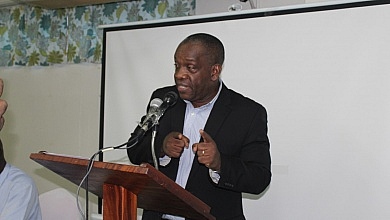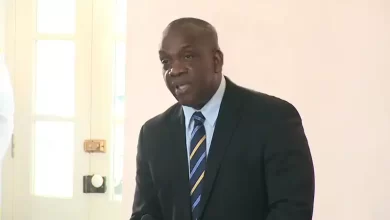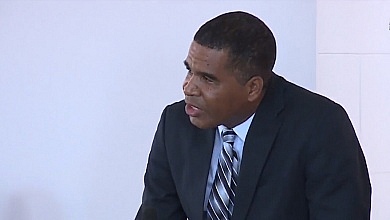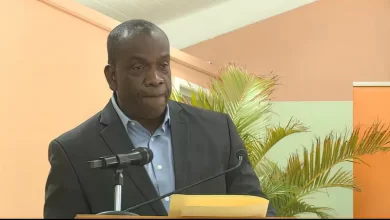Gregor Nassief’s Open Response To Lennox Linton
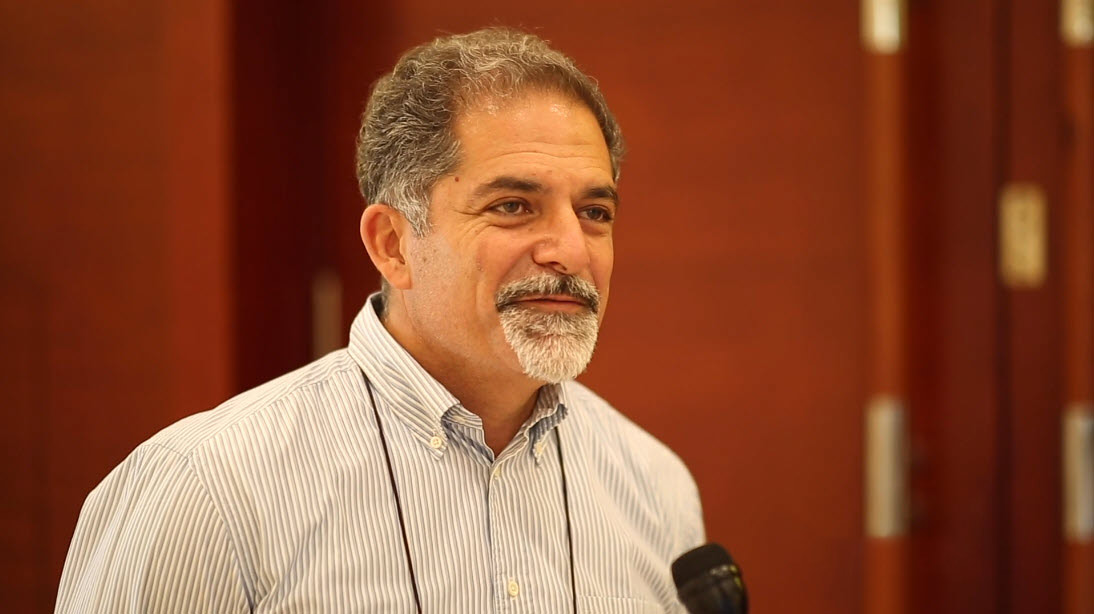
On September 3rd, 2019 on the Hot Seat, you stated in reference to matters relating to the Range/Kempinski Project: “when you examine those elements closely you seeing the outline of an elaborate scheme to cheat and steal.”
If after looking at the scores of programs available worldwide, a potential economic citizen looks at the Dominica program, they are faced with two options tabled below: the Economic Diversification Fund option, also known as the “Donation” option. The other option, called the “Real Estate” option, requires a minimum us$200,000 investment into the Real Estate project and an additional minimum of us$25,000 into the Economic Diversification Fund. The amount going into the Real Estate project is a minimum of us$200,000 regardless of the size of the family, while the associated amount for Real Estate going into the Economic Diversification Fund is a minimum of us$25,000 which increases according to the size of the family:
| COUNTRY | INVESTMENT OPTIONS | 1 PERSON | FAMILY OF 4 |
| DOMINICA | Donation Option | $100,000 | $200,000 |
| Real Estate – Investment into Development (Minimum) | $200,000 | $200,000 | |
| Real Estate – Government Fees | $25,000 | $35,000 | |
| Real Estate – Total | $225,000 | $235,000 |
Before I get into the statements you made surrounding Real Estate, it is important to ask the simple question: Why would a potential economic citizen select the more expensive Real Estate option over the Donation option? A single Applicant typically won’t think twice because the Donation option is us$100,000 while the Real Estate option (investment plus EDF) starts at $225,000. But as the family size grows, say a family of 4, the Donation option is $200,000 vs. the Real Estate option at us$235,000. So at a family size of 4 or more, the potential investor may consider Real Estate for the simple reason that they are investing in something tangible, an asset that they can potentially get a financial return on and potentially resell in the future, while the Donation option is a direct contribution to the Government EDF which does not result in the ownership of an asset. This basic point of the Real Estate investment delivering a tangible asset to the investor seems to escape you as you have used the term “free money” time and time again, recently stating for example “the handing over of the passport, in exchange for monies that end up as free money in the hands of developers to do work in Dominica”.
There is nothing “free” about the investment monies that developers attract. It is not, as you or others may believe, CBI money that the Government has that they hand over to the Developer. It is hard won investment monies in a highly competitive market earned by the developer. As you should be aware, that there are approximately 100 CBI real estate projects in St. Kitts, over 40 in Antigua, almost 20 in Grenada and currently 6 in Dominica plus countless developments in European programs plus the currently quota-restricted EB5 in the US. Why would an investor choose Jungle Bay in Dominica vs. Kimpton Kawana in Grenada vs. Christophe Harbor in St. Kitts vs. Canelles in St. Lucia or a development in Greece or Malta or Cyprus? It’s a hard won battle that agents and developers fight, with very significant sales commissions in the mix, and each investment is scrutinized by the investor, because after all, they can spend less money and simply go with the Donation/EDF option. So there is no “free money” being handed over here.
Another incredible statement from you (with Matt in the background saying “Why do you want a cut”): “I’m asking, if you are making your fees as a seller of passports, you putting the Government’s money in the treasury, you putting the investment now into the real estate project, why are you still taking a commission on the investor’s money, what is supposed to be the investor’s money.” You are implying here that developers are agents “selling passports”. A ludicrous statement. Secret Bay is not a CBI agent, we do not “sell passports” and as such we cannot and do not collect fees from anyone for “selling” or “processing” passports. We are in the business of promoting our real estate, our villas, and attracting investments into those assets. Your reference to “taking a commission on the investor’s money” is also mind boggling. You are using the term “commission” to describe a developer’s profit, and implying that developer’s should not be entitled to a “profit” from selling their hotel or villas or real estate product because they are “making fees as a seller of passports”. So using Secret Bay as an example, I spend 20 years purchasing 33+ acres of land in over 10 separate transactions, I invest tens of millions of dollars, plus borrow money from the bank, our incredible Secret Bay team runs a hotel for eight years with all of their blood, sweat, and tears, we gain unparalleled international recognition with our “local brand” going global, we invest more and embark on building many more villas, and our villas are being sold to both Citizenship and Non Citizenship investors, and every investment dollar we get is hard fought and won, and you, Lennox, are telling me that we are not entitled to a profit? And you claim to be a friend of the private sector?
It is time that you educate yourself on Real Estate development. Outside of the CBI program, real estate developers will aim for anything between a 16% and a 20% return, which we can term a “development profit”. And within the CBI program, due to the higher risks involved, the targeted margins can be higher. Many developments go bankrupt before they are completed, usually because sales lag and/or due to significant construction costs overruns, and the average profit actually achieved in the end for those that do not go bankrupt is often substantially lower.
You further stated: “There is lots of money for them to make over and above what is needed for the hotel development. What is needed for the construction of the hotel”. Have you made any effort Lennox to understand how real estate development works? Are you aware for example that construction costs typically account for between 50% and 60% of the total real estate development costs in a CBI scenario, with sales and marketing expenses, particularly commissions to international marketing agents, adding significant costs, in addition to many other line items including pre-operating costs. As you clearly need to do some research, I suggest you read 2018 HVS Global Hospitality study and the 2018 BCQS Construction Market Trend Report for the Caribbean& Latin America. You will note that costs for Luxury Resorts can and often do exceed us$600,000 per key/room (this is not what it cost to build the room, it is the total construction costs divided by the number of rooms). You will also notice construction prices per Sq. Ft. ranging between us$250 to us$550, and you should know that currently, in Dominica, to build a major hotel requires foreign contractors and crew at significantly higher costs due to lack of available local resources. And finally, you cannot seriously talk about profit without understanding risk. So half way through a major CBI project, the bottom falls out of the CBI market, no more sales, everything grounds to a halt. What happens then to the developer’s investment, the loans, the debt and the half-built project? Bankruptcy happens.
Secret Bay’s example. After 8 years of operations and multiple expansions, and then a battering by Hurricane Maria in 2017, and an incredible effort to re-open in November 2018, we are continuing to expand and build out our resort, and CBI is but one channel of equity financing: there is my own equity, the equity of other shareholders, bank loans, equity investments from non-Citizenship buyers and equity investments from Citizenship buyers. Before we even applied to the Government for approval under the CBI program, nearly ec$20m had been spent, for the land, the resort construction, master planning, design and engineering services of every kind, major infrastructure works, and the list goes on. We applied for CBI approval in 2015 – long after we began operating – and it took an incredible (and in my opinion shameful) 3.5 long years for Government approval which came in February 2019. We have since opened offices in Dubai, engaged Sales Directors in Dubai and Mainland China (for Citizenship sales) and in the Caribbean (for non-Citizenship sales) and invested untold hundreds of thousands of dollars in sales and marketing to promote our villas, and we have already began construction works on the expansion. We have seen no “free money” coming in yet, as you call it, but we are committed to our vision, and willing to take the risk.
“Free money”, and an “elaborate scheme to cheat and steal”? I encourage you Lennox, or any of the “Friends of Lennox Linton” – DO IT! Buy land, produce architectural and engineering concepts, start building, investment everything, borrow money, prepare your budgets and financial forecasts inclusive of your “developers profit”, go through an exhaustive Government approval process, hire a global sales and marketing team, invest in and develop your brand, go out into a global market as a newcomer, travel non-stop, take on the well-established titans, and keep going especially when there is no momentum, and all you have on your shoulders is investment and debt, but keep the faith, keep committed, work 24×7 because now you have to answer agent phone calls at 10pm from Dubai and 2am from China, and keep going, persevere my friend, pursue that elusive profit! After you have done that, then come at us with your serial speculation and illogical inferences.
Now “Housing”, the 3rd option recently made available to investors. Housing is like Real Estate in that there is a private developer involved but it is also like EDF/donation in that the investor gets no asset in return. So it’s a hybrid product, a “mix” of the two (and note that no developer or agent is happy with it because it provides for preferential market pricing to reflect the Government’s priority on housing). So the particular developer finds clients on their own for this “hybrid” CBI offering: the investor invests their money, the developer uses these funds to build out Housing projects and the State, having taken zero risk, gets the Housing assets in return, and the developer reaps a profit.
This bring us to the very important point of how money is accounted for and who “owns” what money, aka “where de money gone”. Note that if the Government was to include in its public accounts, based on how developer contracts are structured, the supposed “missing” money, it would be fraudulent because that money does not belong to Government, it belongs to the developers. This is the standard in all the OECS CBI Programs. In fact, the one situation where a regional Government dared to breach that arrangement and to use the designated funds, they were successfully litigated against by a developer. In other words, if an investor invests us$200,000 in purchasing a Villa, and the developer transfers full title of that Villa to that investor, how can the $200,000 be reported as Government revenue? No, ONLY the $25,000 that the investor pays to Government (refer to table above) is what goes into the Treasury and this is what is reported in the Government’s public accounts. Incredibly, you have not grasped this and prefer, as is traditional for you, to seek spin rather than seeking a deeper understanding and truth.
Now Secret Bay, like all developers, has an Escrow account to which the Government is a signatory. The monies from investors buying villas at Secret Bay that gets past due diligence are deposited in this account – this is Secret Bay’s money, not the Governments, because it is money used to purchase a financial interest in a real estate asset at Secret Bay, it is NOT money being used to “purchase a passport”. Here is the thing you do not seem to understand: the fact that they have made the investment in Secret Bay “qualifies” them for Dominica Citizenship, and then they must also pay the minimum us$25,000 (using the example above) to the Government to obtain Citizenship, but their $200,000 has earned them a real tangible financial interest in a Secret Bay villa.
Why is the Government doing this: because the Government wants its CBI program to generate money a) into its Treasury for direct Government investments, b) into its tourism sector to ensure the country’s hotel plant rapidly expands and c) into its housing sector to deliver a very significant number of homes to the population after two major natural disasters.
You may question the Government’s motivation for structuring the agreements and escrow accounts in this way, but Dominica’s Real Estate program is, in general terms, no different than St. Kitts or Antigua or Grenada, in that the monies that go into those developments are not reflected in Government accounts. The program has seen the re-launch of Jungle Bay, the soon to be opening of Kempinski, and both Anichi and the Hilton are in their construction phases. You may prefer to “eliminate” the private developer from the equation, let the Government do the hard work and let the Government take the full risk of marketing, sales, construction and delivery. I can guarantee you that this would yield a disaster in poorly managed construction projects (aka The Morocco Hotel), massive cost overruns, deadlines going years beyond what they should and half-built or unbuilt hotels. That is why no other Government in the region has structured real estate any different from Dominica.
All of that being said, I am 100% in favor of more transparent accountability so the public has a much better understanding of how the industry is structured and how monies are allocated, but to serially engage in the nonsensical speculation of $1.2b “missing”, and to infer that developers like myself may be involved in an “elaborate scheme to cheat and steal” and to suggest that this is the reason that we are “keeping our mouth shut”, is, as I have said earlier, at best intellectual dishonesty and at worst intellectual incompetence.
This article is copyright © 2019 DOM767





